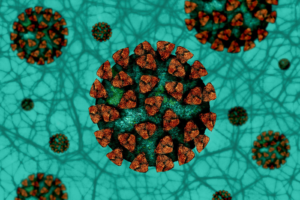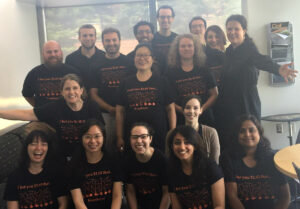Enter your address to receive notifications about new posts to your email.
Articles tagged Genetics Journal
(331 results)
-
100 years since the medaka’s international debut: Aida’s legacy
From a Kyoto garden to scientific discoveries. Since the 17th century, medaka fish have been bred for their beautiful colors. Shortly after the 1900 re-discovery of Mendel’s laws of inheritance, medaka began to be used for genetic studies. Recessive inheritance of the orange-red (b) and white (r) variants, female-limited appearance of the white phenotype, and an…
-
Uncovering SARS-CoV-2 recombination events
New Bolotie method can handle the barrage of sequencing data that posed a problem for conventional recombination algorithms. Humanity has faced many pandemics throughout history, but never before have we tackled an active pandemic while so well equipped with genetic technology. In fact, when SARS-CoV-2 struck, the genetics community produced so much sequencing data so…
-
Working together during the COVID-19 pandemic, a silver lining in a trying time
Guest post by A.J. Marian Walhout, PhD. Massachusetts, March 2020: The early days of the COVID-19 pandemic that would profoundly affect us all. Labs shut down abruptly, assay trials were disrupted, some experiments in progress were thrown out. Now what? With pipettes unused on the bench and the foreseeable future unclear, how long would this…
-
New Senior Editors at GENETICS and G3
GENETICS and G3: Genes|Genomes|Genetics are pleased to announce two new Senior Editors; Sharon Browning is a Senior Editor at GENETICS, and Gustavo de los Campos is a Senior Editor at G3. GENETICS Sharon Browning Sharon Browning is a Professor of Biostatistics at the University of Washington. She received a BS in Mathematics from the University of…
-
Welcome to new editors at G3 and GENETICS
GENETICS and G3: Genes | Genomes | Genetics are pleased to announce four new editors: Leah Cowen, Michael Goddard, Joseph Heitman, and Hongyu Zhao. GENETICS Leah Cowen Leah Cowen is Vice President of Research at the University of Toronto (UofT), Professor in the Department of Molecular Genetics, co-Director of the CIFAR Fungal Kingdom: Threats &…
-
New editors for Experimental Technologies and Resources section of GENETICS
GENETICS is pleased to announce four new editors for the Experimental Technologies and Resources section of the journal: Markus Affolter, Alejandro Sánchez Alvarado, Kristin Tessmar-Raible, and Julie Hayner Simpson. Markus Affolter Markus Affolter is a developmental biologist at the Biozentrum of the University of Basel and his lab has been interested in how cells form…
-
Introducing new Neurogenetics & Behavior editors to GENETICS
GENETICS is pleased to announce eight new editors for the Neurogenetics & Behavior section of the journal: Arantza Barrios, Tamara Caspary, Catherine Kaczorowski, Karla Kaun, Kyuhyung Kim, Roger Pocock, Hongyan Wang, and Jill Wildonger. Arantza Barrios Arantza Barrios is an Associate Professor/Reader in Neurobiology at University College London. Her lab uses the C. elegans male to investigate…
-
Welcoming new Computational Resources, Software, & Databases editors to GENETICS
GENETICS is pleased to announce six new editors for the Computational Resources, Software, & Databases section of the journal: Anastasia Baryshnikova, Judith Blake, Michael Brent, Todd Harris, Marian Walhout, and Valerie Wood. Anastasia Baryshnikova Anastasia is a Principal Investigator at Calico Life Sciences LLC, an Alphabet-founded research and development company focused on understanding the biology of…
-
New editors for Molecular Genetics of Development section of GENETICS
GENETICS is pleased to announce five new editors for the Molecular Genetics of Development section of the journal: Daniela Drummond-Barbosa, Chi-Chung Hui, Hamed Jafar-Nejad, Elliot Meyerowitz, and Karuna Sampath. Daniela Drummond-Barbosa Daniela Drummond-Barbosa is a Professor in the Department of Biochemistry and Molecular Biology at Johns Hopkins University. Her research focuses on the physiological mechanisms…
-
Yeast regain long-lost traits
Yeast circumvent Dollo’s Law and reacquire traits lost tens of millions of years ago from distant relatives. Dollo’s Law, first proposed in the 19th century, holds that evolutionary losses are irreversible — if a species discards a complex trait, it will never reacquire exactly that trait. However, a study published in Genetics highlighted one way that unicellular fungi can…
-
Welcoming new Gene Expression section editors to GENETICS
GENETICS is pleased to announce three new editors for the Gene Expression section of the journal: Julie Claycomb, Joseph Bondy-Denomy, and Geraldine Seydoux. Julie Claycomb Julie Claycomb holds a longstanding interest in gene regulatory mechanisms involved in germline development. She started her lab in the Dept. of Molecular Genetics, University of Toronto, in 2011. She…






